If you’ve ever been shopping for a washing machine, you’ll probably have been faced with the decision of which capacity you should choose.
With machines ranging from 5 kg all the way up to 12 kg, how can you choose the right machine for you?
What Do Washing Machine Capacities Mean?
The kilogram measurement on washing machines does not apply to the weight of the actual machine, of course, it refers to the capacity of the drum. That is, how much laundry it can hold at one time.
As you may have been told, overfilling your washing machine can really damage it and it isn’t great for your clothes either – they will probably come out smellier than they went in!
On the flipside, underfilling your machine can be very wasteful of both energy and water.
Sticking to the specified capacity should ensure that your machine lasts longer and that you are using less energy for each wash cycle.
Exceeding these guidelines regularly could see you experiencing problems with your washing machine.
QUICK NOTE: Some cycles may only apply to a smaller load, so make sure you check with your washing machine manual if you are unsure.
Does the Capacity Refer to Wet or Dry Weight?
This question has confused many because a washing machine is built to make our clothes wet as they clean them, and we all know that wet clothes weigh a lot more than dry clothes.
The Answer: A washing machine’s capacity refers to dry weight.
Usually, a load of laundry to suit the capacity will not fill the drum entirely – people say that your hand should fit, outstretched, between the laundry and the top of the drum.
Of course, if you’re washing a load of denim or heavy bed sheets, this could be different. Check out our post on how many sheets you can safely wash in each capacity of a washing machine.
Which Capacity Should I Choose?
If you’re in need of a new machine or you’re just moving into your own new place, you will probably be looking into a variety of washing machines and assessing which suit your needs the most (unless your lovely family let you bring your washing home each week).
Here’s a little break down of which capacity would be best suited to your living situation:
- 5 kg – Individual person living alone
- 6 kg – A couple or two people living together
- 7 kg – A small family (possibly a couple and a baby or small child)
- 8 kg – A medium family
- 9-10 kg – A large family
- 11-12 kg – A very large family

A larger capacity washing machine will often mean a larger (heavier) machine, so be sure to check the dimensions to ensure it will fit into your kitchen or laundry room.
Larger, more infrequent wash loads could save you some money on your energy bills, so if this is an option for you, you may want to opt for a slightly larger capacity machine.
If you’re looking for a new washer, check out our roundup of the best washing machines on the market in the UK.
QUICK TIP:
If you want to be super sure you’re not under/overloading your washing machine, try standing on your scales with an average wash load for your household and subtract your weight to discover how much the load weighs on its own. Then you can gauge how many of certain items will fit into your wash safely to give the most efficient clean!

In The Wash is your guide to the best laundry and cleaning products, tips and tricks. Our mission is to solve the UK’s cleaning and laundry dilemmas!






